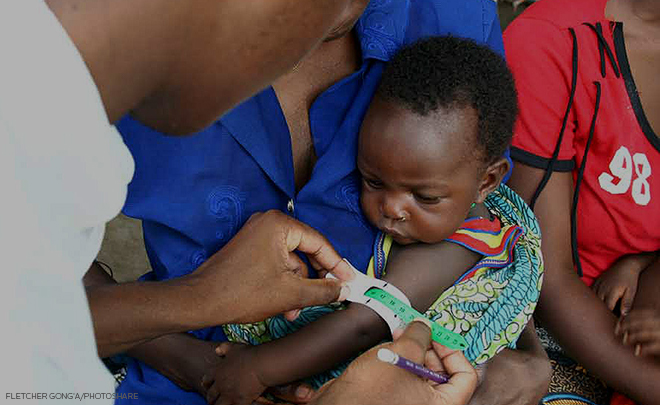
FANTA began providing technical assistance to the Malawi Ministry of Health to support its efforts to improve nutrition in 2013. Focusing on the quality of inpatient care of children diagnosed with severe acute malnutrition (SAM), we developed two training courses to provide health care workers—clinicians and nurses and home-craft workers—with guidance on the practical application of the National Guidelines for the Community-Based Management of Acute Malnutrition (CMAM). Both courses reflect the most recent WHO recommendations on management of SAM in infants and children.
Malawi Training Course on Inpatient Management of Severe Acute Malnutrition
Designed for clinicians and nurses, this training course covers all aspects of case management of a child with SAM with medical complications. Since clinical practice is an essential part of trainings, the course provides daily clinical practice in management of SAM so that participants can apply the skills correctly when they return to their own hospitals. The course includes three guides, seven training modules, and supporting reference material.
- Facilitators Guide
- Clinician Guide
- Course Director Guide
- Modules
- 1. Introduction
- 2. Principles of Care
- 3. Initial Management
- 4. Feeding
- 5. Daily Care
- 6. Monitoring, Problem Solving and Reporting
- 7. Involving Mothers in Care
- Presentation: Orientation on CMAM, National Strategy, and Updates in the 2016 CMAM Guidelines
- Antibiotics Reference Card
- Charts
- Reference Tables for Quantity of F-100 to Give an Individual Child per Feed
- Reference Tables for Infants 0 – 6 Months Old and Older/Infants Weighing less than 3.0 kg
- Stabilisation Phase Reference Tables for F-75 for Children with Severe Wasting
- Posters
- Management of Medical Complications in Severe Acute Malnutrition
- Monitoring Danger signs in Inpatient Management of Severe Acute Malnutrition
- 10 Steps Protocol for Inpatient Care Inpatient Management of Severe Acute Malnutrition
Malawi Training Course on Inpatient Management of Severe Acute Malnutrition for Home-Craft Workers
This training course aims to better equip home-craft workers to assist clinicians and nurses manage inpatient children with SAM. The course covers principles of care; feeding; daily care; monitoring and reporting progress; improving quality of care; and involving mothers in care. The course includes a facilitators guide, a training module, and supporting reference material.


